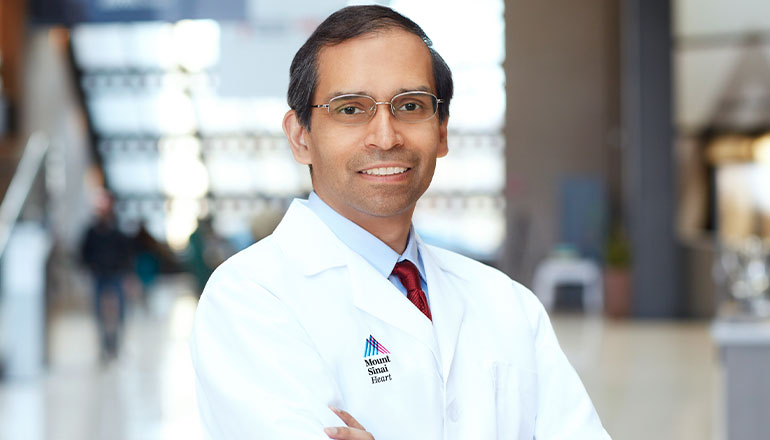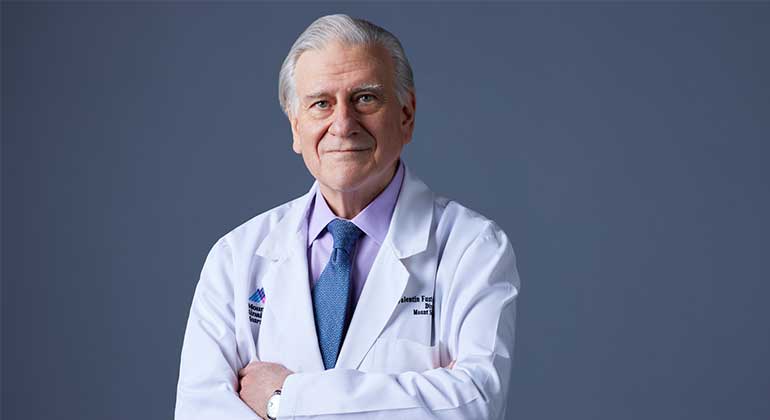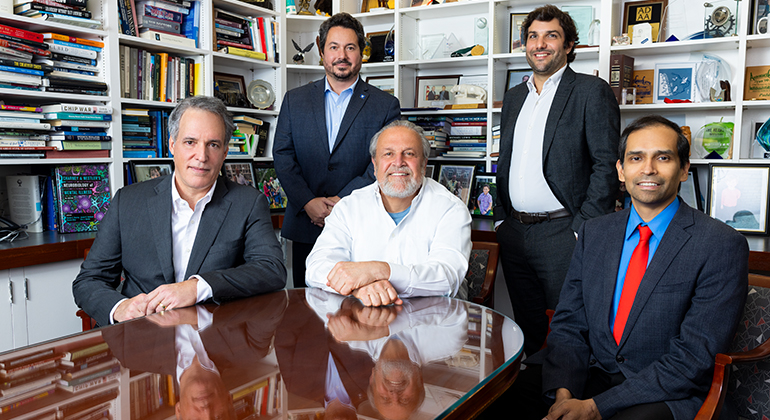Mount Sinai Establishes BioMedical Engineering and Imaging Institute
Center aims to create state-of-the-art medical technology to transform patient care
The Mount Sinai Health System announced the creation of the Biomedical Engineering and Imaging Institute (BMEII), the first of its kind in New York City, and one of a few in the world. The BMEII will leverage Mount Sinai’s renowned imaging and nanomedicine programs to establish a broad biomedical engineering research and training programs for its graduate and medical students. It will develop novel medical inventions in the fields of imaging, nanomedicine, artificial intelligence, robotics, sensors, medical devices and computer vision technologies such virtual real, augmented and extended reality.
The BMEII is projected to be fully operational by early 2020 and will recruit at least nine prestigious principal investigators and their teams. These researchers will join existing Mount Sinai teams to develop cutting-edge biomedical engineering and imaging technologies to improve the detection, diagnosis, treatment, and prevention of a wide range of human diseases such as cancer, cardiovascular, and neurological diseases. Mount Sinai’s Translational and Molecular Imaging Institute, which is at the forefront of brain, heart, and cancer imaging research, along with research in nanomedicine for precision imaging and drug delivery, will be fully incorporated into the BMEII. This will enrich the BMEII’s research programs and have a greater impact on biomedical discoveries and patient care.
“Our imaging and nanomedicine programs are leaders in the development and application of these novel technologies to improve patients’ diagnosis and treatment,” explains Zahi Fayad, PhD, Director of the BMEII. “By integrating artificial intelligence, sensors, robotics, and virtual reality into our programs, the BMEII will take a transformative leap forward in the implementation of next generation medicine and healthcare for our patients and society.”
“The creation of Mount Sinai’s Biomedical Engineering and Imaging Institute represents a crucial milestone for our medical center,” says Eric J. Nestler, MD, PhD, Nash Family Professor of Neuroscience, Director of the Friedman Brain Institute, and Dean for Academic and Scientific Affairs. “Mount Sinai already has established expertise in several areas of imaging and biomedical engineering and we look to further leverage this excellence in creating one of the nation’s leading efforts in this exciting area of medical research.”
Dennis S. Charney, Anne and Joel Ehrenkranz Dean of the Icahn School of Medicine, and President for Academic Affairs for the Mount Sinai Health System, says, “Mount Sinai has consistently been at the forefront of advancing health care, and the BMEII will revolutionize how we use technology to treat a wide range of conditions. This is a unique endeavor that will create a hub for world-class researchers and innovators, and position us to find groundbreaking solutions for treating disease.”
The BMEII will focus on three research areas:
Artificial Intelligence in Advanced Imaging
Investigators at the BMEII will create new computational tools and algorithms to accelerate and improve the way radiologists generate, interpret, and deploy clinical imaging technologies to improve the speed and accuracy of diagnosis. They will build upon the significant successes of Mount Sinai researchers who have already developed radiology augmentation technologies that can rapidly triage the severity of neurologic injuries, accurately characterize the type of cancer a patient may have, and identify the early presence of coronary disease before it was thought to be possible. Another goal will be to streamline the workflow of radiologists, giving clinicians the freedom to focus on the most complex cases. These advancements will lead to earlier detection of a wide range of diseases.
Next Generation Medical Technologies
This research area will focus on developing new medical devices to improve patient outcomes. Since the BMEII will be fully integrated into the Mount Sinai Health System, it can draw from the interdisciplinary fields of engineering and daily clinical practice. As such, the BMEI Institute is uniquely positioned to ensure a needs-based approach to medical devices, where technology developments will be deeply rooted in our desire to improve patient outcomes.
For example, wearable technologies based on smart sensors may alert patients with heart disease to blood pressure or cholesterol level changes so they can avoid a potential cardiac event, or they may alert patients with post-traumatic stress disorder that their stress levels are extraordinarily high.
The BMEII also aims to advance robotic surgery by developing more portable, flexible, and miniaturized robotic devices that can be used to improve treatments for many conditions in areas such as cardiology, cancer, orthopedics, and interventional radiology.
Virtual, Augmented, and Extended Reality (VR/AR/XR)
This research area in computer vision will focus on the unexplored use of virtual, augmented, and extended reality digital technologies in several areas of medicine. VR, AR, and XR technologies are poised to significantly improve the way we educate and train future generations of researchers and physicians, and how we understand patient-specific disease processes, treat pain and anxiety, and build personalized mechanisms of engagement between doctors and patients. For example, advanced image acquisition, analysis, and artificial intelligence will be leveraged to build patient-specific disease process models in order to help surgeons better plan for surgery, guide their work during surgery, analyze results, and drive robotic interventions. These models can also be used to communicate the course of care with patients, which has already been demonstrated in state-of-the-art work within the Department of Neurosurgery and other departments at Mount Sinai.
Education and Training
Included in the mission of the BMEII is the development of a curriculum of bioengineering courses available to students in Mount Sinai’s graduate and medical schools. Some of these courses will include medical imaging, nanomedicine, machine learning, and biodesign. The BMEII students will earn a certification or concentration in bioengineering upon graduation.
These research programs will be housed in the Hamilton and Amabel James Center for Artificial Intelligence and Human Health, the first center in Manhattan to combine research in artificial intelligence with data science and genomics in a standalone site.
To learn more about the BMEII click on the link below:
bmeii.mssm.edu
About the Mount Sinai Health System
Mount Sinai Health System is one of the largest academic medical systems in the New York metro area, with 48,000 employees working across seven hospitals, more than 400 outpatient practices, more than 600 research and clinical labs, a school of nursing, and a leading school of medicine and graduate education. Mount Sinai advances health for all people, everywhere, by taking on the most complex health care challenges of our time—discovering and applying new scientific learning and knowledge; developing safer, more effective treatments; educating the next generation of medical leaders and innovators; and supporting local communities by delivering high-quality care to all who need it.
Through the integration of its hospitals, labs, and schools, Mount Sinai offers comprehensive health care solutions from birth through geriatrics, leveraging innovative approaches such as artificial intelligence and informatics while keeping patients’ medical and emotional needs at the center of all treatment. The Health System includes approximately 9,000 primary and specialty care physicians and 11 free-standing joint-venture centers throughout the five boroughs of New York City, Westchester, Long Island, and Florida. Hospitals within the System are consistently ranked by Newsweek’s® “The World’s Best Smart Hospitals, Best in State Hospitals, World Best Hospitals and Best Specialty Hospitals” and by U.S. News & World Report's® “Best Hospitals” and “Best Children’s Hospitals.” The Mount Sinai Hospital is on the U.S. News & World Report® “Best Hospitals” Honor Roll for 2024-2025.
For more information, visit https://www.mountsinai.org or find Mount Sinai on Facebook, Twitter and YouTube.

Deepak L. Bhatt, MD, MPH, Named Director of Mount Sinai Heart
Oct 31, 2022 View All Press Releases
Valentin Fuster, MD, PhD, Named President of Mount Sinai Heart
Oct 18, 2022 View All Press ReleasesAmerican Heart Association and Mount Sinai Health System Launched “Life is Why”
Feb 13, 2017 View All Press Releases